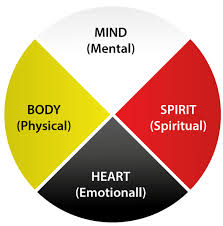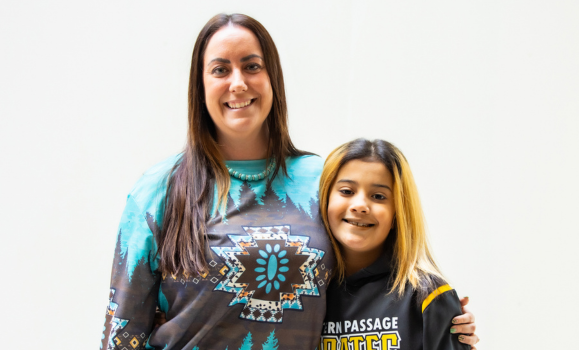News
» Go to news mainLighting the path: Courtney Pennell's mission to support and empower Indigenous nursing students

Courtney Pennell is creating the change she once needed—bridging worlds with care, culture, and courage.
When Courtney Pennell stepped into her new role with as Mi’kmaq Indigenous Nurse Education Specialist, it wasn’t just a career move—it was a full-circle moment. A registered nurse with nearly a decade of experience, a mother, a researcher, and a proud member of Wasoqopa’q First Nation, Pennell carries with her a fierce dedication to supporting Indigenous nursing students across Kjipuktuk and beyond.
“I didn’t have these types of supports when I was going through the program… I know how different it would have been.”
Beyond the classroom
Pennell’s role is far-reaching. She supports Indigenous nursing students from recruitment to graduation, helping them navigate everything from academic resources and funding to cultural support and research opportunities. It’s a wholistic model guided by the medicine wheel—mental, emotional, physical, and spiritual well-being.

“In Western or colonized institutions, we only think about mental and physical—our roles deliver that wraparound support, so students are held in all aspects of who they are.”
She helps students apply for bursaries and scholarships, connects them with tutors or emergency financial assistance, facilitates peer gatherings, and ensures that cultural needs—such as ceremony or Indigenous holidays—are respected and accommodated.
“I advocate alongside students so they can be their best selves. Our ancestors were deprived of these opportunities—we’re reclaiming them.”
Bridging systems with Etuaptmumk
A central philosophy guiding Pennell’s work is Etuaptmumk, or Two-Eyed Seeing—bringing together Indigenous ways of knowing with Western knowledge systems (the gift of multiple perspectives). As someone who grew up in urban Halifax and reconnected with her Mi’kmaw identity through the Native Friendship Centre, Pennell understands how isolating academia can feel for Indigenous students.
“When they come from community, it’s a culture shock… We’re helping them not only stay in the program, but to thrive in it.”
She is also involved in decolonizing nursing curriculum—restructuring courses to reflect Indigenous worldviews, stories, and strengths, not just trauma.
“It’s important people see themselves reflected in a meaningful and strengths-based way. Otherwise, it perpetuates harm on students who are already vulnerable.”
From hospital halls to healing research
Before joining °Ő˛ąÂáľ±°ě±đľ±łľÉ¨°ě, Pennell spent nearly ten years as a nurse and later as the first Indigenous Health Consultant at IWK Health. It was during this time that she found her calling in Indigenous research.
“I was asked to do a healing dance at a summit, and that’s where I met Dr. Margot Latimer—she recruited me on the spot.” Dr. Latimer is a Professor in the School of Nursing and is cross-appointed in the Department of Medicine, ¶¶ŇůĘÓƵ. She is the CIHR Nursing Chair in Indigenous Health Research for NS and holds a scientific appointment at IWK Health where she co-leads the Aboriginal Children’s Hurt and Healing Initiative (ACHH).
Working with the Centre for Pediatric Pain Research and the Aboriginal Children’s Hurt and Healing Initiative, Pennell co-developed new tools to help Indigenous children express pain in culturally safe ways. As she explains, “In Mi’kmaw, there’s no direct word for pain”—a powerful example of why Western scales don’t always work.
“If you can’t even express pain in your language, how are you supposed to explain it using Western tools?”
Her research isn’t just academic—it’s deeply personal, a continuation of her lifelong mission to challenge discrimination and address health inequities in Indigenous communities.
Driven by love, grounded in legacy
At the heart of Pennell’s work is her son, now eight, who has grown up alongside her career and studies. She’s currently completing her MScN (Master of Science in Nursing) at Dalhousie, writing a thesis on cultural safety in healthcare delivery for Indigenous patients and families.

As a single mother navigating co-parenting and academia, Pennell says it’s her connection to culture, community, and her son that fuels her through the most difficult days.
“Watching him grow and still flourish through all our transitions—it keeps me grounded. He makes it easy to work extra hard to give us a good life.”
Her employer’s willingness to welcome her son at meetings and community events speaks volumes to the kind of work culture she’s helping create—one where Indigenous families, values, and futures are honored.
A future worth fighting for
Courtney Pennell is not just helping students earn degrees—she’s helping them heal, reconnect, and take their place in a healthcare system that has long overlooked them. She’s proof that creating change from the inside out is not only possible—it’s essential.
“We, as a nation, need to do better. As healthcare providers, we have a duty to create safe spaces. And as Indigenous peoples, we’re reclaiming what was taken—and making space for our brilliance to thrive.”
Recent News
- New aspiring Health Leaders Award invests in the future of health administration
- New clinic set to revolutionize respiratory care in Nova Scotia
- Grad profile: Inspired by the comfort and care of nurses
- Grad profile: Transformative network of support
- Grad profile: A career built on compassion and purpose
- Grad profile: Lifelong passion for serving others
- Grad profile: Leaving space for what comes next
- Dal Health Fall Convocation
